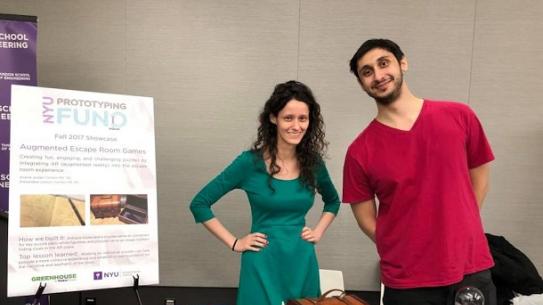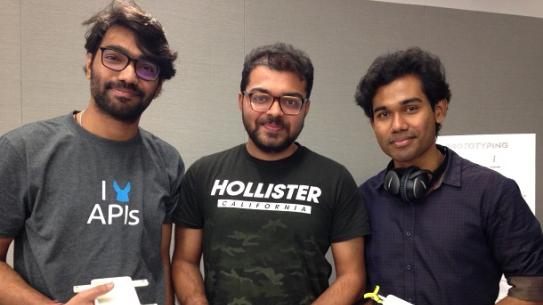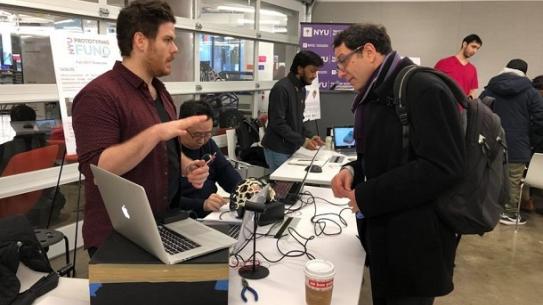Students' Prototypes Take on Virtual Reality, Smart Technology, and Robotics

Swapnesh Wani, Purva Patel, and Supreeth Kumar demonstrate their flying mobile case to Associate Professor Anne-Laure Fayard at the Prototyping Fund Showcase.
Each semester the NYU Prototyping Fund supports innovators and budding entrepreneurs from across NYU schools and surrounding universities. Sponsored by NYU Tandon MakerSpace’s Greenhouse program and the NYU Entrepreneurial Institute, the Fund awards $500 to student-led teams in the first round of funding and up to $2000 in the second to test and develop their unique ideas, solutions, and products.
Of the 15 teams awarded this semester, 11 featured collaboration across disciplines with students representing schools such as NYU Tandon, Tisch, and Steinhardt. On December 6, the teams displayed their prototypes, including those made by Tandon students who explored augmented and virtual reality (AR/VR), smart technology, and robotics. As many Tandon-led ventures such as We Are the New Farmers, INVIP, and Peris got their start at the Prototyping Fund, these students are in good company.
“It’s exciting to see the results of our 9th Prototyping Fund,” shared Anne-Laure Fayard, associate professor of Technology, Management and Innovation and adviser to the Greenhouse program. “Frank Rimalovski from the NYU Entrepreneurial Institute, who’s been my partner in crime since the beginning of this collaborative program, and I reflected on how the quality of the prototypes has evolved over the years. This semester we noticed many more iterations of the prototype, showing that teams fully embrace the iterative approach — an essential dimension of our prototyping philosophy.”
Tandon Teams:
Augmented Escape Room Games

Integrated Digital Media (IDM) graduate students Alexandros Lotsos’ 18 and Acacia Judge ’18 are using AR technology to add another dimension to the escape room experience. Modeled after the popular adventure game, where players find clues to a mystery and solve puzzles to break out of a room, Lotsos’ and Judge’s project integrates AR technology to create “more challenging puzzles that use AR to expand the possibilities of items or clues in our game,” Lotsos said.
Drispen
Lindsey Kim '19 and Ruby Pittman '20, both majors in Business and Technology Management (BTM), are developing a smart pen that digitizes notes and drawings without the need for a tablet. “We’re both artists and business students, and this idea stemmed from our frustration with expensive art supplies and tools,” Pittman said. Using infrared LED light and a microchip, the pen will work on any flat surface to capture drawings or words you write, transferring them through Bluetooth to an online platform. Kim and Pittman credit Technology Management and Innovation lecturer Michael Driscoll with supporting their project, and they even named their pen after him.
Fly-M

Many people accidentally drop their phones, causing cracked screens or other damage, which prompted Purva Patel ’19, Supreeth Kumar ’19, and Swapnesh Wani ’19 to devise a unique solution to lessen the impact. The Mechatronics and Robotics master’s students created a phone case that turns your phone into a miniature quadcopter. The 3D-printed case uses sensors to detect motion and distance, and is modeled after a quadcopter, releasing tiny propellers that gently lower your phone when falling. Next for the team? “We’re focusing on different parts to reduce the size and weight of the case, and we’re planning a sensor that flips around your phone if it’s falling front first,” Wani said.
FruitNow
Aiming to bring fresh and affordable fruit to NYU students, BTM student Jenny Zheng ’20 and Kent Ma ’20 have created the mobile app Fruit Now that provides students with a weekly subscription box filled with fruits, such as berries, apples or lychee. Tapping into the international network of fruit farmers, Zheng hopes to offer easier access to high-quality fruit and is in talks to allow the use of NYU Dining Dollars.
Geckobot

The Tandon team behind Geckobot are developing a compact robot to clean building windows and facades. “Currently, commercial window cleaning robots are quite large and very expensive. Instead of using one big robot, we propose using five to 10 small robots that are more efficient and low-cost,” Yi Wei ’19, a Mechanical Engineering graduate student, said. Team members include Mingzhe Ye ’19, Yunzhu Li ’19, Zhengqing Ye ’19, Mo Wu ’19, Cindy Li ’19, and Wei.
Posture Sensing
Many people’s neck and backaches stem from poor posture, a fact that the team behind Posture Sensing hopes to assuage using headphones that can detect improper posture. Using an accelerator and a compass, your headphones can calculate pressure on your spine and alert users to adjust their position and lessen harmful effects of bad posture. Team members include Emily Huang ’18, Brandon Rogowski ’18, Timothy Wong ’18, Aidan Collins ’18, and Kaitlyn Yiu, Steinhardt.
SOLAR
A group of computer science, electrical, and mechanical engineering students have designed a modular solar panel system to navigate Mars’ surface and provide sustainable and efficient power for future Mars expeditions. Part of NASA’s Breakthrough, Innovative and Game-changing (BIG) Idea Challenge, their compact modular system works like an accordian — extending and contracting solar panels that will be equipped with sensors to avoid obstacles, radio-frequency identification (RFID) technology to communicate with other Mars vehicles, and can withstand Mars’ dust storms. Team members include: Aida Mehovic ’19, Leonardo Lamboglia ’19, Randy Martinez ’19, Matthew Persad ’19, and Yoon Cho ’19.
WAVR

WAVR, developed by Baris Siniksaran '18 (IDM) and Sean Kim (Interactive Telecommunications Program), is an immersive experience where your brain waves can control virtual reality technology. “One of the main questions we’ve been exploring with WAVR is how our technology can be effective in improving people’s lives,” Siniksaran said of their latest prototype, WAVR: Self Discover. Using color and virtual reality for therapy purposes, WAVR: Self Discover is “designed to help people see reality from a different perspective through the alternating perception of virtual reality.”
Applications for the Prototyping Fund will re-open in Spring '18. Visit the Prototyping Fund website for more information.
Camila Ryder
Graduate School of Arts and Science
Master of Arts in English Literature, Class of 2018


